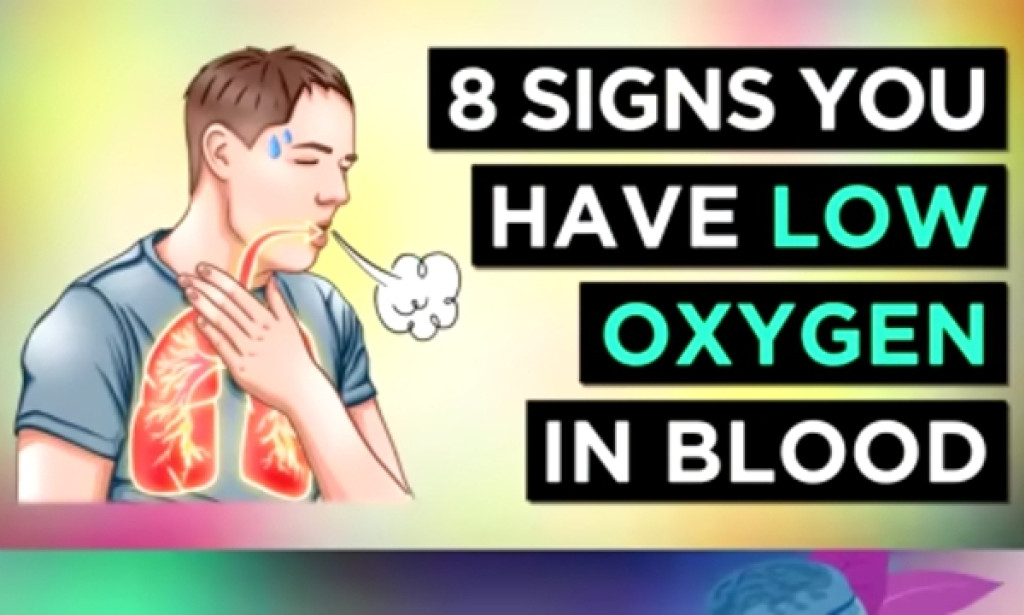Oxygen is essential for the proper functioning of our bodies. It is carried through our bloodstream to all organs and tissues, providing them with the energy they need to perform their functions. When the level of oxygen in our blood is low, it can lead to a condition known as hypoxemia. Identifying the warning signs of low oxygen in your blood is crucial for early detection and prompt medical intervention. In this article, we will discuss eight common warning signs that may indicate low oxygen levels in your blood.
Shortness of Breath: One of the most noticeable signs of low oxygen in your blood is experiencing difficulty in breathing. You may feel like you can't take a deep breath or catch your breath, even with minimal exertion. This shortness of breath can be accompanied by a sensation of tightness in your chest.
Rapid Breathing: When your body senses low oxygen levels, it compensates by increasing the rate of your breathing. This rapid breathing, also known as tachypnea, is a way for your body to try to bring in more oxygen. If you find yourself breathing faster than usual without any apparent reason, it could be a sign of low oxygen in your blood.
Blue or Pale Skin: Another visible indication of low oxygen levels is the discoloration of your skin. When there is insufficient oxygen in your blood, your skin may appear bluish or pale, especially in your fingertips, lips, or nail beds. This condition, called cyanosis, is a result of poor oxygenation.
Confusion or Cognitive Impairment: Oxygen deprivation can affect your brain function, leading to confusion, difficulty concentrating, or memory problems. If you find yourself struggling to think clearly or experiencing sudden changes in mental status, it could be an indication of low oxygen in your blood.
Fatigue and Weakness: Low oxygen levels can cause a feeling of constant tiredness and general weakness. Your body requires an adequate supply of oxygen to produce energy efficiently. When this supply is compromised, you may experience extreme fatigue, lack of energy, and a decreased ability to perform daily tasks.
Rapid Heart Rate: Your heart works harder when oxygen levels are low to compensate for the reduced oxygenation. This can lead to an increased heart rate or palpitations. If you notice your heart pounding or racing even at rest, it may be a sign that your blood oxygen levels are below normal.
Headaches: Hypoxemia can cause headaches, which are often described as throbbing or dull. These headaches may be accompanied by dizziness or lightheadedness. If you frequently experience unexplained headaches, it is essential to consider low oxygen levels as a possible cause.
Chest Pain: In some cases, low oxygen in the blood can lead to chest pain or discomfort. The chest pain may feel like a squeezing sensation, tightness, or heaviness. It is crucial not to ignore chest pain, as it can be a sign of a more serious underlying condition requiring immediate medical attention.
It is important to note that these warning signs may vary in severity and can be caused by factors other than low oxygen levels. However, if you experience any of these symptoms persistently or if they worsen over time, it is crucial to consult a healthcare professional for a thorough evaluation.
Early detection and treatment of low oxygen in the blood are vital to prevent complications and ensure your overall well-being. A healthcare provider can perform diagnostic tests, such as arterial blood gas analysis, pulse oximetry, or a complete blood count, to assess your oxygen levels accurately.
In conclusion, recognizing the warning signs of low oxygen in your blood is crucial for timely intervention. If you experience any of the symptoms mentioned above, it is essential to seek medical attention promptly. Low oxygen levels can be caused by various underlying conditions, such as lung diseases, heart problems, anemia, or respiratory infections. A healthcare professional will be able to evaluate your symptoms, perform necessary tests, and provide appropriate treatment to address the underlying cause.
Ignoring the signs of low oxygen in your blood can have serious consequences for your health. Prolonged hypoxemia can lead to organ damage, impaired cognitive function, and even life-threatening complications. Therefore, it is essential to prioritize your well-being and seek medical assistance when needed.
In addition to seeking medical attention, there are a few steps you can take to optimize your oxygen levels. Maintaining a healthy lifestyle, including regular exercise, a balanced diet, and adequate hydration, can help improve oxygen circulation in your body. Avoiding exposure to environmental pollutants, quitting smoking, and managing chronic conditions effectively can also contribute to better oxygenation.
Furthermore, for individuals with chronic respiratory conditions, such as asthma or chronic obstructive pulmonary disease (COPD), it is crucial to follow the prescribed treatment plan and use supplemental oxygen therapy if recommended by your healthcare provider. This can help ensure that your oxygen levels remain within a healthy range and reduce the risk of complications.
Being aware of the warning signs of low oxygen in your blood is essential for maintaining good health. Shortness of breath, rapid breathing, blue or pale skin, confusion, fatigue, rapid heart rate, headaches, and chest pain are all potential indicators of low oxygen levels. If you experience any of these symptoms persistently or they worsen over time, it is crucial to consult a healthcare professional for evaluation and appropriate management. Early detection and treatment can make a significant difference in your overall well-being and help prevent complications associated with low oxygen in the blood. Remember, your health is paramount, and taking prompt action is the key to a healthy and fulfilling life.



You must be logged in to post a comment.